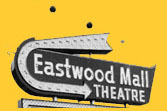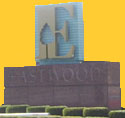| The mall opened to much fanfare ... headlines blared
"A
new era for shopping in Birmingham." Quoting from one
story that day: "Living comforts of the next decade
have become breathtaking reality in the Heart of Dixie. These are
sights of the 1970s about which other cities talk. In Birmingham,
they exist. A masterpiece of shopping luxury never before seen in
the Deep South."
Newman Waters made sure the grand opening was something
to remember. The ceremony was emcee'd by Bill Bolen, then News Director
of WSGN (and for decades a news personality WBRC-TV). Speaking were
Mayor James Morgan and Gov. John Patterson. Singer and actor Vaughan
Monroe was on hand for entertainment. Waters' 4-year-old granddaughter
Lois Jolly had the honor of cutting the ribbon.
Three artesian wells were used to power a heat pump for
Eastwood's ventilation system, keeping the temperature at an average of
73 degrees year-round. There was parking for 2,500 vehicles.
Waters spared no expense ... he commissioned a local horticulturalist to
furnish the interior of the mall to simulate the feeling of Spring.
More than 200 tropical plants, ferns, trees and flowers were shipped in
from Florida, at a cost of $5,000. Mr. Waters meant it when he said
it IS always Springtime at the mall!
Among the initial tenants were Aladdin
Cleaners, Bell Brothers Shoes, Colonial Stores, Duane's Shoes, Eastwood
Barber Shop, Gordon's Quality Jewelers, Happy House Shops, Hill's Food
Store (later to become Winn-Dixie), Kinney Shoes, S. S. Kresge (dime store
chain which evolved into the present-day Kmart), Kroger, Lerner Shops,
Liggett Drug, Kiddieland, Mall Record Shop & Appliance Center, J. J.
Newberry's, Olan Mills, JCPenney, a Top Value Stamps redemption center,
Wendy's Sportswear, and an Alabama ABC Package Store ... just in case you
needed a stiff drink after the missus maxed out the BTNB charge card with
all that shopping.
Eastwood Lanes, with its 'star'
icon atop the sign, adjacent Funtown amusement area, and the much-fabled
"Boom-Boom Room", was the finest recreational venue in Birmingham, boasting
48 lanes of bowling. A go-cart track was located at the other end
of the mall.
The mall was a success. So
much so that six months later, there was talk of an expansion. The
1960s would see three such expansions of Eastwood Mall.
 On
Christmas Day 1964, The Eastwood Mall Theater opened for business.
Originally it was a single-screen auditorium, equipped for Cinerama movies
such as 2001: A Space Odyssey and Ice Station Zebra.
Regular visitor and contributor Tom Frieling of Athens, Ga., and
Birmingham native, recalls the first movie to be shown here was The
Pleasure Seekers with Ann Margaret. The Eastwood Mall Theater
would challenge the '20s-era Alabama Theater downtown as the most
popular place to catch a movie. A breezeway connected it, Hill's
Winn-Dixie Food Store, and a new Pasquale's Pizza. On
Christmas Day 1964, The Eastwood Mall Theater opened for business.
Originally it was a single-screen auditorium, equipped for Cinerama movies
such as 2001: A Space Odyssey and Ice Station Zebra.
Regular visitor and contributor Tom Frieling of Athens, Ga., and
Birmingham native, recalls the first movie to be shown here was The
Pleasure Seekers with Ann Margaret. The Eastwood Mall Theater
would challenge the '20s-era Alabama Theater downtown as the most
popular place to catch a movie. A breezeway connected it, Hill's
Winn-Dixie Food Store, and a new Pasquale's Pizza.
The next year, another expansion added Camera World, Barber's
Cafeteria (later longtime fixture Pioneer Cafeteria), a furniture store
and a bookstore. And in 1966, the go-cart track was sacrificed in
order to add a feature now common to shopping malls: an anchor store.
Iconic Birmingham retailer PIZITZ opened a giant department store on the
east end of the mall. The footprint that Eastwood Mall would have
for many years was now in place.
* * * * * * * * *
 In 1968, Newman Waters sold Eastwood Mall to Farm Bureau Insurance (today
known as ALFA). The mall prospered into the 1970s, despite competition
entering the picture on the west side of town, first with a "mini-mall"
addition to Five Points West in 1968 (also anchored by Pizitz), and a year
later with the opening of Western Hills Mall. And around this time,
the Starlite Drive-In was closed down, demolished and replaced with Eastwood
Plaza, a companion strip center. Kmart was its anchor, and still
operates today.
In 1968, Newman Waters sold Eastwood Mall to Farm Bureau Insurance (today
known as ALFA). The mall prospered into the 1970s, despite competition
entering the picture on the west side of town, first with a "mini-mall"
addition to Five Points West in 1968 (also anchored by Pizitz), and a year
later with the opening of Western Hills Mall. And around this time,
the Starlite Drive-In was closed down, demolished and replaced with Eastwood
Plaza, a companion strip center. Kmart was its anchor, and still
operates today.
In the mid '70s, the Mall Theater followed many other
single-screen venues and split its auditorium in half in order to offer
two screens. Other cosmetic changes to the mall included the addition
of carpeting, and a drop-tile 'suspended' ceiling over its corridors.
1975 saw Brookwood Village (Alabama's first two-story
mall property), straddling the suburbs of Mountain Brook, Homewood and
Vestavia Hills. And in 1976, Eastwood Mall was faced with a new rival
... this one located diagonally across US 78 from the mall itself: Century
Plaza. Brookwood and Century were of the new style of upscale "bland
box" malls, and provided quite a contrast to the now quaint single-story
Eastwood ... with many of the interior tenants maintaining outside entrances.
In the early 1980s, Pizitz left Eastwood and moved across
the way to Century Plaza, taking over the anchor spot vacated by Loveman's
when that department store went under. Service Merchandise soon took
over Pizitz's old location.
Pizitz', however, kept its Eastwood Mall auto service
outparcel for a number of years afterward, even after selling out to McRae's
in 1986 (later it would become a Goodyear store before closing altogether;
while Goodyear insignia remained visible on the building's exterior, along
its back wall was a label-scar for McRae's).
Despite its outdated design, Eastwood Mall continued to
hold its own. Farm Bureau sold the property to Jim Wilson & Associates
in September 1984 -- the same company who would develop Alabama's largest
shopping mall, Riverchase Galleria, in 1986. Plans were to begin
modernizing the aging mall by the late '80s.
* * * * * * * * *
 1989-90: Eastwood Mall receives a top-to-bottom facelift, adding a food
court, a Books-A-Million store and an even larger store for Parisian, an
Eastwood tenant since 1969. This second anchor was built into the
mall in an unusual diagonal position. This gave Parisian two separate
inside entrances. At the same time, with the increasing popularity
of multi-screen cinemas, the venerable Eastwood Mall Twin was closed.
1989-90: Eastwood Mall receives a top-to-bottom facelift, adding a food
court, a Books-A-Million store and an even larger store for Parisian, an
Eastwood tenant since 1969. This second anchor was built into the
mall in an unusual diagonal position. This gave Parisian two separate
inside entrances. At the same time, with the increasing popularity
of multi-screen cinemas, the venerable Eastwood Mall Twin was closed.
Eastwood got a second wind with its new, improved look.
The food court had a beautiful atrium, and a giant bank of video screens.
Both it and Century Plaza were successful well into the '90s.
But at the end of the decade enclosed shopping malls began
falling out of favor ... open-air "lifestyle centers" are now becoming
the preferred mode of shopping in many places. The first major open-air
venue in Birmingham was The Summit, making its bow in 1997 in the south
suburb of Hoover. The Summit is credited by the International Council
of Shopping Centers as being the first "lifestyle center" in the country.
Another bold step for Birmingham!
With The Summit, Birmingham appeared to be past the saturation
point. There are only so many shopping venues a market can profitably
handle. The laws of Darwin soon went into play, which began hurting
both Eastwood Mall and Century Plaza. Century held in at first, but Eastwood
-- by now owned by investment outfit Lehman Brothers -- started
hemorrhaging tenants, without any to replace them. One by one they
vacated, and by 2003 Eastwood Mall was down to its last half dozen tenants.
In spite of what was already an empty void throughout the heart of the
mall, Eastwood had become a popular venue for senior "mallwalkers", taking
advantage of a well-lit, clean and safe environment to exercise and socialize.
That wasn't enough. The costs
of maintaining and controlling the climate for a large section of the mall
not generating revenue led the management of Eastwood to close the interior
on 1 August 2004.
Lehman Brothers had been in talks
with several retailers over the last several years, in a futile effort
to jump-start the vintage property. Those efforts were further hindered
when another nail in Eastwood's coffin occurred in January of 2005: sole
remaining anchor store PARISIAN closed its doors (an event hitting close
to this writer's family tree. My aunt worked at Eastwood's Parisian
for almost 20 years).
Party City closed its doors late
in '05, and Books-A-Million wrote its epilogue Saturday, 25 February 2006.
All of Lehman's efforts to revitalize
Eastwood Mall failed. Wal-Mart struck a deal to purchase the property
where Eastwood Mall sits, and planned to develop a new shopping venue,
anchored by a "Supercenter."
Demolition of the outparcel buildings,
including the old Eastwood Lanes, began late in May of 2006. And
the taking down of the big building itself, air conditioned sidewalks and
all, took place over the course of that Summer.
The Wal-Mart Supercenter, centerpiece
of the new Eastwood Village, opened to much fanfare on Wednesday, 24 October
2007. Fortunately, Wal-Mart recognized the historical and sentimental
value of that plot of land. Local Wal-Mart management graciously
allowed Mr. Maury Levine and his group "Friends of Eastwood Mall" to design
and put together a shadowbox, paying tribute to the former mall, with some
pictures and a capsule history of the property. It currently sits
near the front of the store.
[Century Plaza would not survive
much longer. It too bled tenants, Rich's (since acquired by Macy's)
locked up and bailed, and with Sears' closure on 31 May 2009, another of
Birmingham's shopping malls joined Eastwood in retail's past tense.]
While the South's oldest indoor
shopping mall may be gone, Mr. Waters' legacy lives on; the new center
is called Eastwood Village. Still, this writer is among
many who mourn the passing of a piece of history, a very distinctive "first"
and ambitious act of progress and forward thinking in a city all too often
struggling with her past demons.
Eastwood Mall was more than just
another cookie-cutter indoor shopping center; to the Magic City of the
'60s, '70s and '80s it was an experience. The "E" will live forever
in our memories and our hearts.
********* text by Russell Wells
###
Source for most early information:
"Skeptics
scoffed, but Eastwood Mall prevailed", The Birmingham News,
Wednesday., 09/11/1985., among other articles in a special promotional
section commemorating Eastwood's 25th anniversary.
Other information for this page came from correspondence
with Tim Hollis, Thomas Frieling, Mrs. Ira E. Wood and personal recollections.
Pictures
| The area | Memories
| The end | HOME
Page constructed 11/05/2004
-- 1205 AM EST
UPDATED 02/05/2011 --
740 PM EST
|